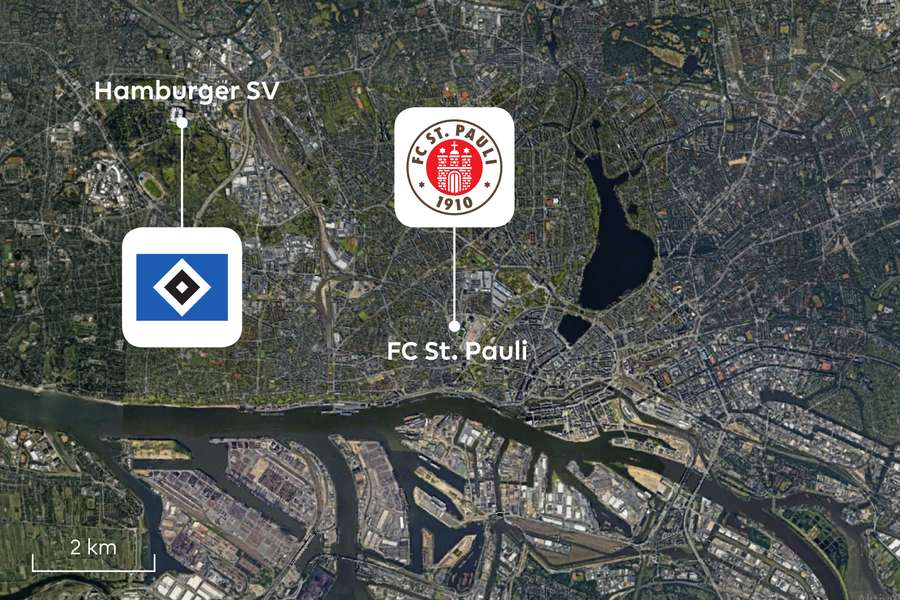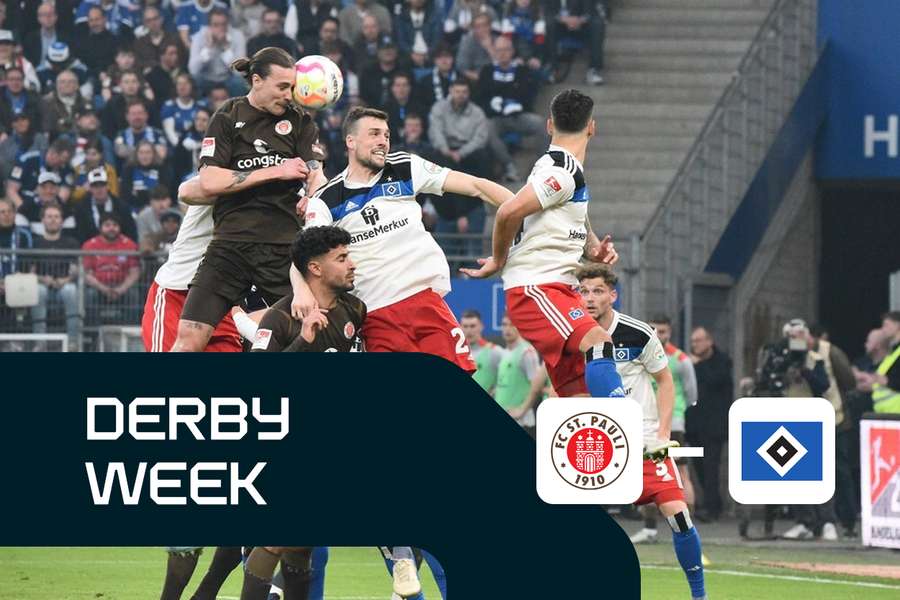Hamburg's HSV and St. Pauli have operated in different tiers of the league system for most of their existences but for the last five years, they have clashed on the second-tier stage. Rather than a football battle for the city, however, their derby is a clash of differing ideologies and social values.
The Hamburger Sport-Verein, as the official name of the larger of the rivals goes, has lifted the German championship title six times (albeit most recently in 1983), won several other domestic trophies and stood in the final of a European Cup five times. In doing so, they managed to win it twice - the former Cup Winners' Cup in 1977 and the most prestigious European Champions Cup six years later.
By contrast, FC St. Pauli, a club from the eponymous district of Hamburg's city centre, has more or less been the smaller club in the city throughout its history. It has zero trophies in the bank. From a purely footballing point of view, however, neither the players nor the fans of St. Pauli are bothered by their second-rate position within Hamburg.
At the turn of the 1970s and 1980s, when HSV was one of the best teams in Europe, St. Pauli was between the 2nd and 3rd leagues. People describe the relationship between the two clubs at the time as neutral, even friendly. HSV and St. Pauli were certainly not competing football-wise at the time, yet the mood between the two camps quickly began to change and turn into resentment.

A 'non-football' derby
The main reason for the strained relationship between the two rivals, or rather between their fan groups in particular, lies in the transformation of society as a whole in the 1970s and 1980s.
At that time, fascist views began to spread vehemently in Germany, manifesting themselves in the xenophobic behaviour of neo-Nazis towards various groups of the population, numerous protests from one side or the other of these social conflicts and, not infrequently, violence.
Unfortunately, those sentiments also seeped into football. Most football stadiums in Germany became bastions of right-wing extremism. The neo-Nazis were mainly found among members of ultras fan groups. Hamburg SV was no exception in this respect, as a strong club attracting a large number of supporters.
On the other hand, St. Pauli fans began to be profiled with completely opposing views and values. Already in the 1970s, the club was popular with punks and anarchists. The fact that it was (and still is) a centre of freethinking is evidenced by the Sankt Pauli district itself, famous for the Reeperbahn.
The area is a well-known centre of nightlife, where a number of clubs, alternative restaurants and sex shops were established during the 20th century, earning the street the name 'die sündige Meile' (the sinful mile). Prostitution is even allowed in some parts of the Reeperbahn.
Like the whole district, the St. Pauli football club has become a bohemian haven for the alternative-minded. As a counterpoint to the mass spread of neo-Nazism, FC St. Pauli attracted mainly left-wing supporters.
The image of the club from this era onwards is also illustrated by a black pirate flag with a skull and crossbones, brought into the stadium by fans.
The pirate symbolism, including the nickname Freibeuter (pirates or buccaneers), quickly caught on with the club and its supporters. Alongside rebelliousness, it also expresses St. Pauli's position as an underdog institution in opposition to the rich and powerful, as well as the mainstream. In all these cases, one could say that, at least within Hamburg itself, it stands in opposition to the team and fans of the great HSV.
A peculiar club with principles
The values that have come to symbolise the fan base of St. Pauli are also shared by the club's management. The entire organisation began to actively fight against the fact that hateful and racist behaviour from spectators would ever occur at their Millerntor stadium. It even included prohibitions against such behaviour in the stadium's code of conduct and now has a list of basic principles that everyone from players to fans must follow.
This 'bible' represents a range of social values that go far beyond sport. Among the topics that the St. Pauli organization is dedicated to are social responsibility, ecology, environmental sustainability, charity and more.
Concrete examples of such activities include projects to help socially excluded groups, a collection among fans for water purification plants in developing countries in Africa, and various anti-fascist initiatives such as a tournament for fan clubs of football teams with similar views and values across Europe.
One of the club's underground and peculiar projects is to organise a tournament for countries that are not members of the world football organisation FIFA. The so-called FIFI Wild Cup, which St. Pauli hosted in 2006, featured teams from Tibet, Greenland, Zanzibar, North Cyprus, and Gibraltar - the hosts flew the pirate flag under the name 'Republik St. Pauli.'
In keeping with the club's rebellious reputation, the tournament was also interesting in that the teams were escorted onto the field of play before the game by strippers from nightclubs in nearby Reeperbahn instead of children.
Thanks to its principles, St. Pauli is a club that goes against the tide, honouring values such as sustainability while fighting discrimination, racism and many other forms of hatred in society. As a result, it has become a cult with a worldwide reputation.
2018 - Extinction of the dinosaurs
When the Bundesliga was founded in 1963, the rule was that only one club could represent each city. This privilege in Hamburg was given to HSV. As a result, they did not meet their neighbours from St. Pauli very often or regularly.
In the more than 100-year history of the Hamburg derby, the two teams have met only 109 times. Only 16 times in the top flight. The overall record speaks clearly in favour of the team from the Volksparkstadion for more than 50,000 spectators - HSV have won 69 derbies, St. Pauli 24.
For a long time, the Blueblacks were the only team that never left the top tier since the Bundesliga was founded. As a result, the club's nickname was the 'Dinosaurs' and the legendary timekeeper hung a clock in the HSV stadium to measure the time spent in the top flight.
In 2018, however, HSV were finally relegated and the two Hamburg clubs suddenly became rivals one league lower.
Since the 2018/19 season, HSV have been trying in vain to make a comeback. Although they have not been completely far from it in any of their five league attempts, their path is often crossed by St. Pauli, who have been on the rise in terms of results in recent years. The Hamburg derby has also become a purely sporting rivalry. The results of the most recent fixtures are proof of that.
The 110th derby between St. Pauli and HSV will take place in the great and authentic atmosphere of the Millerntor stadium on Friday, December 1st at 18:30 CET.
Other derbies this week:
Friday, December 1st
Northern Ireland - NIFL Premiership
The Big Two Derby
Linfield have 56 championship titles to their name, Glentoran have been champions 23 times. These are the strongest and most successful Northern Irish clubs. There have been 644 matches between the so-called 'Big Two'. Most recently, in November in the League Cup Eight Final, Linfield won 2-1.
Sunday, December 3rd
Netherlands - Eredivisie
De Kraker
The top two teams in the table will clash in the Dutch Eredivisie. The traditional Dutch football showdown between Feyenoord Rotterdam and PSV Eindhoven is called 'De Kraker', which could be loosely translated as the 'cracker.' PSV won the first match of the season, when the two teams clashed in the Super Cup, 1-0.
Slovenia - Prva Liga
Večni derby (Eternal derby)
The rivalry between the traditional Slovenian rivals came to life in 2009, when Olimpija managed to fight their way back into the league after years of existential hardship. Since then, it has even won the title three times and is the reigning champion from last season. Maribor is the most successful club in Slovenia with 16 titles.
Monday, December 4th
Denmark - Superligaen
Slaget om Midtjylland (Battle of Midtjylland)
The rivalry between Danish clubs Viborg FF and FC Midtjylland has only recently emerged - after the latter's formation in 1999. The latter is based in the town of Herning, 45 kilometres away from Viborg. Both towns lie in the region of Central Jutland (Midtjylland in Danish). The first derby of the season ended 2-2.




